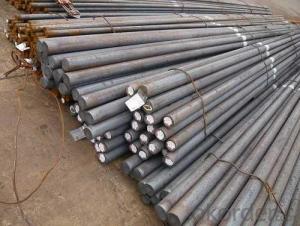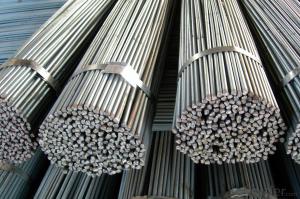Steel Round Bar SS400/S20C/SAE1020/S235JR/S275JR
- Loading Port:
- Tianjin
- Payment Terms:
- TT OR LC
- Min Order Qty:
- 25 m.t.
- Supply Capability:
- 25000 m.t./month
OKorder Service Pledge
Quality Product, Order Online Tracking, Timely Delivery
OKorder Financial Service
Credit Rating, Credit Services, Credit Purchasing
You Might Also Like
Hot Rolled Steel Round Bar
| Standard | Grade | C% | Mn% | Si% | P% | S% | Cr% | Ni% | Cu% | ||
| JIS G3103 | SS330 | <0.050 | <0.050 | <0.20 | |||||||
| SS400 | <0.050 | <0.050 | <0.20 | ||||||||
| SS490 | <0.050 | <0.050 | <0.20 | ||||||||
| JIS G4051-2005 | S15C | 0.13-0.18 | 0.30-0.60 | 0.15-0.35 | <0.030 | <0.035 | <0.20 | ||||
| S20C | 0.18-0.23 | 0.30-0.60 | 0.15-0.35 | <0.030 | <0.035 | <0.20 | <0.20 | <0.20 | |||
| ASTM A36 | ASTMA36 | <0.22 | 0.50-0.90 | <0.40 | <0.040 | <0.050 | <0.20 | <0.20 | <0.20 | ||
| ASTM A568 | SAE1015 | 0.13-0.18 | 0.30-0.60 | <0.040 | <0.050 | <0.20 | <0.20 | <0.30 | |||
| SAE1017 | 0.15-0.20 | 0.30-0.60 | <0.040 | <0.050 | <0.20 | <0.20 | <0.30 | ||||
| SAE1018 | 0.15-0.20 | 0.60-0.90 | <0.040 | <0.050 | <0.20 | <0.20 | <0.30 | ||||
| SAE1020 | 0.15-0.20 | 0.30-0.60 | <0.040 | <0.050 | <0.20 | <0.20 | <0.30 | ||||
| EN10025 | S235JR | 0.15-0.20 | <1.40 | <0.035 | <0.035 | <0.20 | |||||
| S275JR | <0.22 | <1.40 | <0.035 | <0.035 | <0.20 |
Packaging & Shipping
In Bundles with strong lines. Accordig to our experience, It's export package which can keep round bar steady.
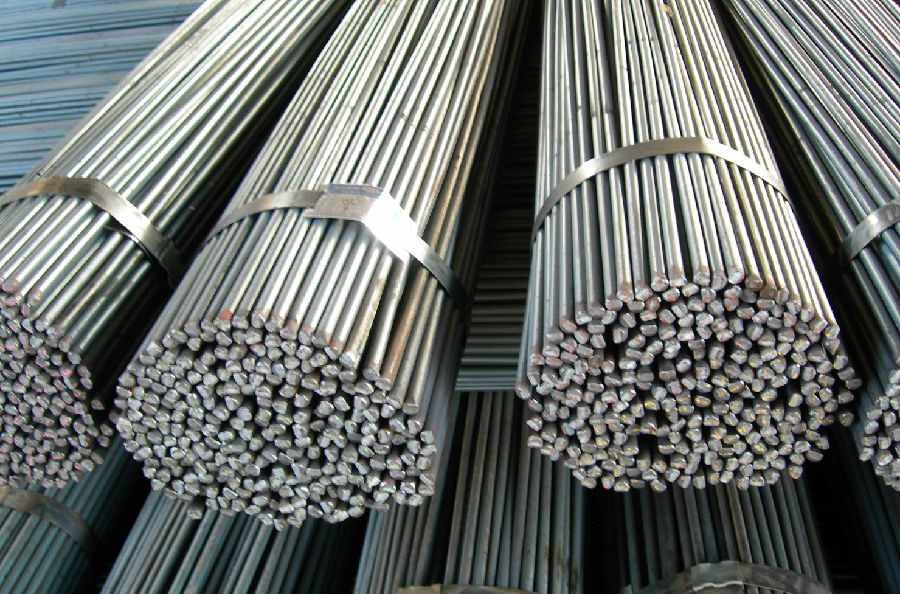
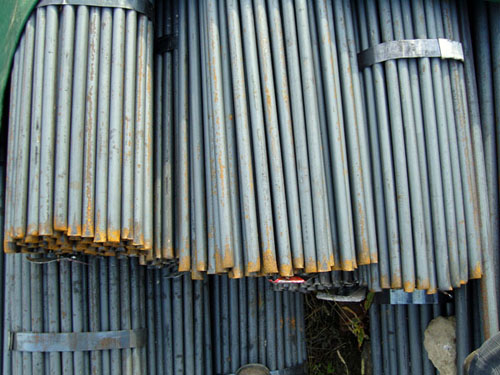
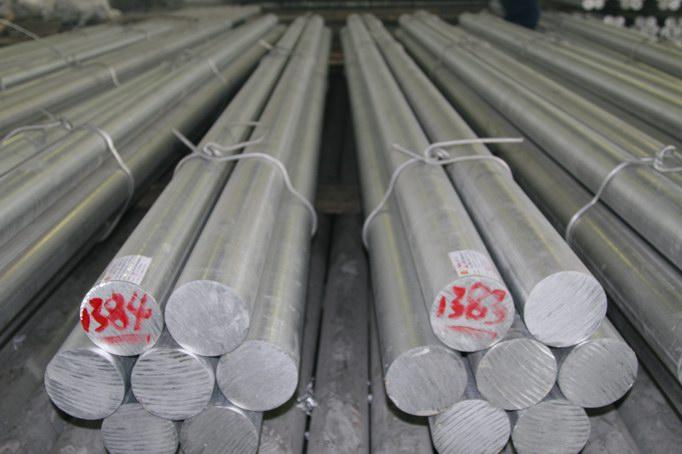
- Q:Can steel round bars be cut to custom lengths?
- Yes, steel round bars can be cut to custom lengths. Steel round bars are versatile and can be easily cut using various methods such as sawing, shearing, or torch cutting. These methods allow for precise customization of the length according to specific requirements or project needs. Additionally, steel round bars are commonly available in standard lengths, but they can be easily cut shorter or extended by welding pieces together. Overall, steel round bars offer flexibility in terms of length customization, making them suitable for a wide range of applications.
- Q:What are the different types of steel round bar coatings used in the automotive industry?
- There are several different types of steel round bar coatings that are commonly used in the automotive industry. These coatings are applied to the steel bars to enhance their durability, corrosion resistance, and overall performance. 1. Galvanized Coating: This is one of the most widely used coatings for steel round bars in the automotive industry. Galvanized coating involves applying a layer of zinc to the surface of the steel bar. This coating provides excellent corrosion resistance, protecting the steel from rust and other forms of degradation. 2. Epoxy Coating: Epoxy coatings are often used in automotive applications that require high chemical resistance. This type of coating provides a protective barrier against chemicals, moisture, and other corrosive substances. Epoxy coatings also have excellent adhesion properties, ensuring long-lasting performance. 3. Powder Coating: Powder coating is a popular choice for steel round bars in the automotive industry due to its durability and aesthetic appeal. This coating involves applying a dry powder to the surface of the steel bar, which is then heated to create a tough, protective layer. Powder coatings come in a wide range of colors and finishes, allowing for customization and branding opportunities. 4. Ceramic Coating: Ceramic coatings offer exceptional heat resistance, making them ideal for automotive applications that involve high temperatures. This type of coating provides a protective barrier that prevents heat damage and improves the overall lifespan of the steel round bars. 5. Phosphate Coating: Phosphate coatings are often used as a pre-treatment before applying other types of coatings. This coating improves the adhesion of subsequent coatings and provides additional corrosion resistance. Phosphate coatings also enhance the lubricity of the steel bar, reducing friction and wear. These are just a few examples of the different types of steel round bar coatings used in the automotive industry. Each coating offers unique benefits and is chosen based on the specific requirements of the application. Overall, these coatings play a crucial role in improving the performance and longevity of steel round bars in automotive applications.
- Q:How do you prevent scaling of steel round bars during heat treatment?
- One way to prevent scaling of steel round bars during heat treatment is by using a protective atmosphere such as nitrogen or hydrogen gas. This atmosphere helps create a barrier between the steel surface and the oxygen in the air, preventing oxidation and scaling. Additionally, applying a coating or using a salt bath can also provide a protective layer on the steel surface, minimizing scaling during the heat treatment process.
- Q:What are the advantages of using nickel-copper alloy steel round bars?
- Nickel-copper alloy steel round bars offer several advantages. Firstly, their resistance to corrosion and oxidation is excellent, making them ideal for use in harsh environments like the marine or chemical industries. This ensures the longevity and durability of the bars, reducing the need for frequent replacements. Secondly, these round bars have outstanding mechanical properties. The addition of nickel and copper enhances their strength, toughness, and hardness, making them suitable for heavy-duty applications in construction, manufacturing, and engineering. They can withstand heavy loads and resist deformation or breakage, contributing to the overall safety and reliability of the structures or components they are used in. Another advantage is their excellent thermal stability. The alloy has a low coefficient of thermal expansion, allowing it to withstand high temperatures without significant dimensional changes. This is particularly important in applications involving extreme heat, such as in the aerospace or power generation industries. The thermal stability of the bars ensures their dimensional integrity, reducing the risk of warping or cracking under high-temperature conditions. Furthermore, Nickel-copper alloy steel round bars offer good electrical conductivity. This is beneficial in applications that require the transmission of electric current, such as electrical wiring or power distribution systems. The high electrical conductivity of the alloy ensures efficient and reliable electrical connections, minimizing power loss and maximizing performance. In conclusion, the advantages of nickel-copper alloy steel round bars include excellent corrosion resistance, superior mechanical properties, thermal stability, and good electrical conductivity. These characteristics make them suitable for a wide range of applications in various industries, providing durability, strength, and reliability.
- Q:What are the advantages of using shock-resistant steel round bars?
- There are several advantages of using shock-resistant steel round bars in various applications. Firstly, shock-resistant steel round bars are designed to withstand high impact and shock loads, making them ideal for use in industries such as construction, automotive, and manufacturing. This property of shock resistance ensures that the round bars remain intact and maintain their structural integrity even under extreme conditions. Another advantage of shock-resistant steel round bars is their enhanced durability. These round bars are made from high-quality steel alloys that have been specifically engineered to provide superior strength and resistance to wear and tear. This makes them highly resistant to bending, cracking, and fracture, ensuring a longer lifespan compared to regular steel round bars. Additionally, shock-resistant steel round bars offer improved safety in applications where there is a risk of impact or sudden loads. By using these round bars, the likelihood of structural failure or catastrophic accidents is significantly reduced, providing a greater level of security for both workers and the overall operation. Moreover, shock-resistant steel round bars are known for their excellent machinability and weldability. This means that they can be easily shaped, cut, and welded to meet specific requirements, allowing for versatility in design and manufacturing processes. This ease of manipulation makes them a preferred choice for various projects where customization is necessary. Furthermore, shock-resistant steel round bars offer cost-effective solutions. Due to their high durability and resistance to wear, they require less frequent replacements, resulting in reduced maintenance and replacement costs. Additionally, their ability to withstand shock loads reduces the need for additional reinforcement or support structures, further reducing overall project expenses. In conclusion, the advantages of using shock-resistant steel round bars include high impact resistance, enhanced durability, improved safety, excellent machinability, and cost-effectiveness. These properties make them a reliable and efficient choice for a wide range of applications, ensuring long-lasting and reliable performance.
- Q:What are the different types of steel round bar profiles?
- There are several different types of steel round bar profiles available in the market. Some of the most common profiles include: 1. Plain Round Bar: This is the most basic and commonly used profile. It is a solid cylindrical bar with a smooth surface and uniform diameter throughout its length. 2. Deformed Round Bar: This type of round bar has deformations or ribs along its surface. These deformations provide better bonding with concrete when used in reinforced concrete structures, making it ideal for construction applications. 3. Hollow Round Bar: As the name suggests, this profile has a hollow center. It is often used in industries where weight reduction is important or where the round bar needs to be used as a conduit for fluids or gases. 4. Threaded Round Bar: This profile has threads along its length, allowing it to be easily screwed into other components. It is commonly used in applications where secure fastening or adjustability is required. 5. Half-Round Bar: This profile has a flat side and a rounded side, giving it a semi-circular shape. It is often used in decorative applications, such as handrails, where a sleek and aesthetically pleasing appearance is desired. 6. Square Bar: Although not strictly a round profile, square bars are often included in this category. These bars have four equal sides and are commonly used in applications where higher torsional strength is required. 7. Hexagonal Bar: Similar to square bars, hexagonal bars have six equal sides. They are often used in applications where high torque resistance is needed or when a distinctive appearance is desired. These are just some of the different types of steel round bar profiles available. The choice of profile depends on the specific application requirements, such as structural strength, bonding capabilities, or aesthetic considerations.
- Q:What is the weight of a steel round bar?
- The weight of a steel round bar can vary depending on its dimensions and the type of steel used. Generally, the weight of a steel round bar can be calculated by multiplying its volume (pi times the square of the radius times the length) by the density of the steel.
- Q:What is the typical lead time for manufacturing steel round bars?
- The lead time for manufacturing steel round bars can vary depending on different factors, including the bars' size and quantity, the complexity of the manufacturing process, and the manufacturer's production capacity. Typically, manufacturing steel round bars takes anywhere from a few days to several weeks. When it comes to standard sizes and quantities, the lead time is usually shorter since manufacturers keep them in stock. However, custom orders or larger quantities require additional processes such as sourcing raw materials, cutting, heat treating, and quality control checks, which can extend the lead time. It's important to consider that market demand and the manufacturer's production schedule can also impact lead times. During periods of high demand or limited production capacity, lead times may be longer. Conversely, during times of low demand or surplus production capacity, lead times can be shorter. To get an accurate estimate of the lead time for manufacturing steel round bars, it is recommended to directly contact specific manufacturers or suppliers. They will be able to provide more precise information based on their capabilities and current workload.
- Q:Are steel round bars suitable for the production of valves?
- Yes, steel round bars are suitable for the production of valves. Steel is a strong and durable material that can withstand high pressure and temperature conditions commonly encountered in valve applications. The round shape of the bars allows for easy machining and shaping of various valve components. Additionally, steel offers excellent corrosion resistance, making it an ideal choice for valves used in industries such as oil and gas, chemical, and water treatment.
- Q:What are the different types of steel round bar alloys for improved machinability?
- There are several types of steel round bar alloys that are specifically designed to improve machinability. These alloys are chosen for their ability to be easily shaped, cut, and drilled, which is crucial in various machining applications. Some of the commonly used steel round bar alloys for improved machinability include: 1. 12L14 Steel: This alloy contains added lead, which enhances its machinability. The presence of lead lubricates the cutting tool, reduces friction, and improves chip formation during the machining process. 2. 1215 Steel: Similar to 12L14, 1215 steel also contains added lead, which provides excellent machinability. This alloy is known for its high cutting speeds, smooth surface finish, and improved chip control. 3. 4140 Steel: Although not specifically designed for machinability, 4140 steel is known for its excellent overall machining properties. With proper heat treatment, this alloy offers good strength, toughness, and wear resistance while still maintaining a reasonable level of machinability. 4. 1018 Steel: This low carbon steel alloy is widely used for its excellent machinability. It is easy to cut, drill, and shape, making it suitable for a variety of machining operations. However, it may have lower strength compared to some other alloys. 5. 8620 Steel: This alloy is specifically designed for case hardening, but it also offers good machinability. 8620 steel can be easily machined, providing high surface finish and dimensional accuracy. 6. 416 Stainless Steel: This stainless steel alloy provides good machinability due to its sulfur content. It is used in applications where corrosion resistance is required along with improved machinability. These are just a few examples of steel round bar alloys that are chosen for their enhanced machinability. The selection of the appropriate alloy depends on the specific machining requirements and the desired properties in the final product.
1. Manufacturer Overview |
|
|---|---|
| Location | |
| Year Established | |
| Annual Output Value | |
| Main Markets | |
| Company Certifications | |
2. Manufacturer Certificates |
|
|---|---|
| a) Certification Name | |
| Range | |
| Reference | |
| Validity Period | |
3. Manufacturer Capability |
|
|---|---|
| a)Trade Capacity | |
| Nearest Port | |
| Export Percentage | |
| No.of Employees in Trade Department | |
| Language Spoken: | |
| b)Factory Information | |
| Factory Size: | |
| No. of Production Lines | |
| Contract Manufacturing | |
| Product Price Range | |
Send your message to us
Steel Round Bar SS400/S20C/SAE1020/S235JR/S275JR
- Loading Port:
- Tianjin
- Payment Terms:
- TT OR LC
- Min Order Qty:
- 25 m.t.
- Supply Capability:
- 25000 m.t./month
OKorder Service Pledge
Quality Product, Order Online Tracking, Timely Delivery
OKorder Financial Service
Credit Rating, Credit Services, Credit Purchasing
Similar products
New products
Hot products
Related keywords

